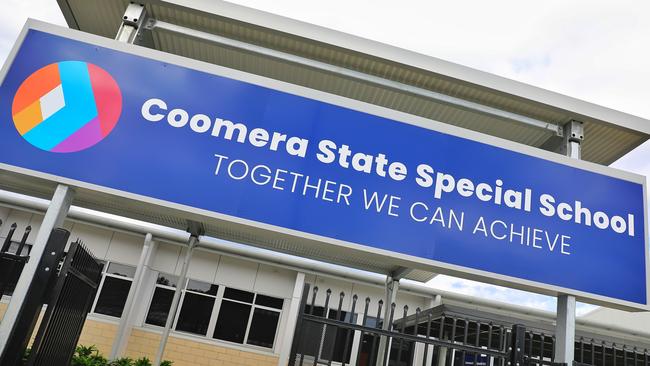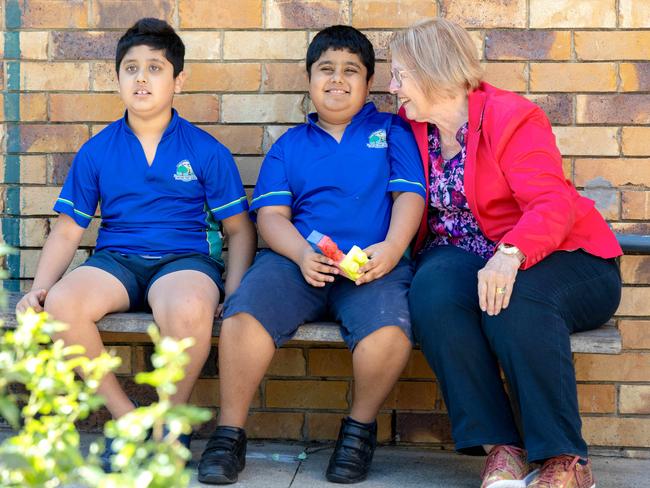Qld special school enrolments: Biggest waiting lists exposed
Students are in temporary classrooms or languishing on waiting lists as Queensland grapples with a shortage of special schools. SEARCH THE LIST

Schools Hub
Don't miss out on the headlines from Schools Hub. Followed categories will be added to My News.
Skyrocketing demand for public special school spots across Queensland has been forcing students into temporary classrooms, while others languish on ballooning waiting lists.
The state government is spending millions acquiring land to expand existing schools, while business cases are being worked up on multiple new facilities.
Queensland has 46 public special schools that provide specialised and individual programs for students with significant support needs, and who have an intellectual impairment.
Overall enrolments at the schools grew by almost 25 per cent from 5375 to 6740 students from 2020-24, amid ballooning waiting lists.
About 87 per cent of that growth occurred in the South East Queensland education regions of Metropolitan South, Metropolitan North and South East.
An analysis of the data by The Courier-Mail found the Beenleigh and Logan City schools had the highest number of enrolments and the biggest increase in students over the five years.
The rate of enrolments at Palmview, Sunnybank and Coomera are also booming.
Enrolment pressure at the Prep to Year 12 Darling Point Special School prompted the state government to pay $25m for a 2.5 hectare site next to Manly West State School.
To accommodate Darling Point’s current 173 enrolments, a number of students have been attending a temporary satellite campus at Iona College since 2022.
There is no option to expand the school at its current site, with the education department expected to complete a concept master plan for infrastructure by the end of the year.
Education Minister John-Paul Langbroek said detailed planning was ongoing to address the growing demand for special schools across Queensland.
The Department of Education has allocated more than $70 million this financial year for infrastructure at 30 existing special schools to deliver improved accessibility, general learning spaces and key facilities.
“The Crisafulli LNP government is committed to building new special schools and upgrading current facilities, because all Queensland kids deserve a world class education system,” he said.
“(We) will continue to listen to teachers and principals in their local communities, because they know what’s best for their staff and students.
“We also back parents to make their own decisions on the individual needs of their children.”
Queensland Teachers’ Union president Cresta Richardson said the number of school students, and equally the number with complex needs, had increased over the past 20 years.
“We note, many parents report long wait lists in our special schools with many existing facilities operating at capacity,” she said.
“In this time, we have also seen a shift to inclusion models attempting to educate all students in mainstream classes with additional staff and resourcing.
“Some complex needs students require significant resources for this model to work.
“Queensland state schools are currently underfunded at a state and national level which can leave significant portions of the day where just one teacher is accountable for the entire class.”
Queensland Advocacy for Inclusion CEO Matilda Alexander said this was a “really good” reminder to think about, how we can open up all schools so that they are inclusive and accessible for people with disability to be able to learn alongside their sisters, brothers and peers.
“The concern about segregated models of whether it’s education, housing or employment, is that it entrenches disadvantage,” she said.

“We all want to live in a world where we have an inclusive society, where people with disability are able and people without disability are able to achieve their full potential and receive the support that they need to learn what they’re interested in,” she said.
Darling Point Special School principal Charmaine Driver said it would be great to have additional land for another campus.
“We have grown quite substantially over the 30 year period that I’ve been here,” she said.
Ms Driver said the eligibility criteria for special schools were now “much tighter” than they were in the past.
“So whilst there are more children getting enrolled, the criteria that the children have to meet is much, much more detailed and stringent than it was in the past.”
Father Fahad Ashraf – whose sons Ahmed, 8, and Zaviyar, 9, attend Darling Point Special School – said the school offered extra support compared to mainstream schools.
“The school has always been so kind and supportive,” he said.
“Special needs kids come with their own challenges, so it's been quite a journey for my wife and I.”
Mr Ashraf said he was very happy with the school and had seen an increase in the number of children there.
“They definitely need the space,” he said.
Meanwhile, the future of the Red Hill Special School Campus on Waterworks Rd, set to close under an amalgamation plan with the nearby Ithaca campus on Fulcher Rd, remains uncertain.
In a question on notice, Mr Langbroek said the former Labor government had not received confirmation the campus would be turned into a dedicated specialist school, with third parties interested in taking over the site.




